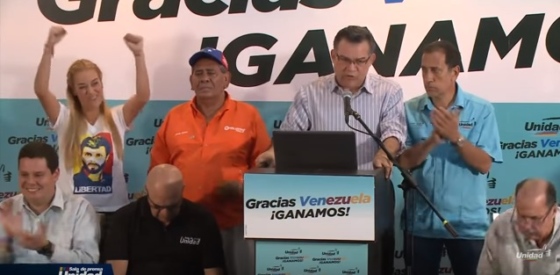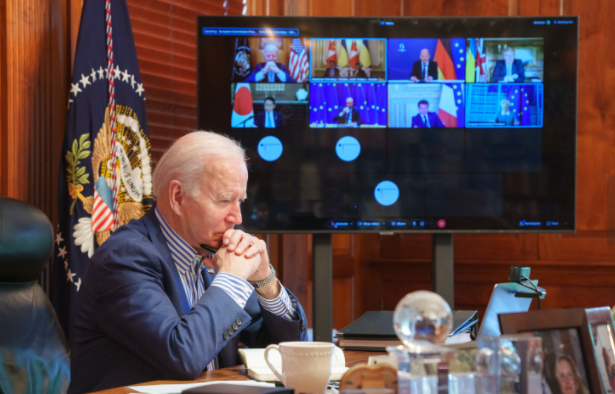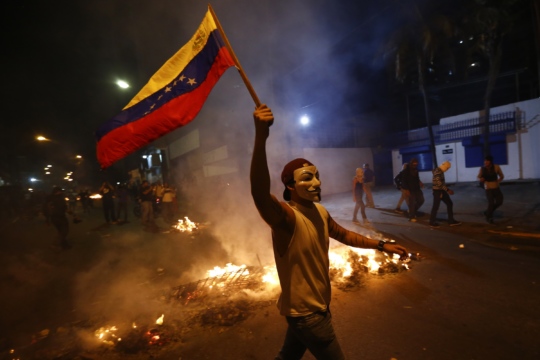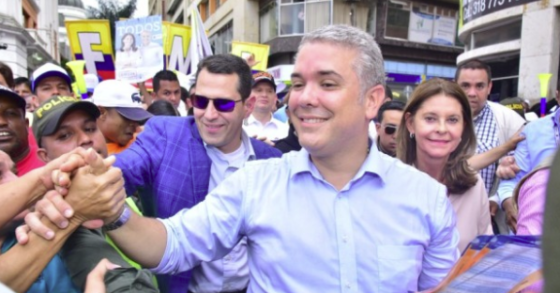
What Does the Future Hold for Venezuela?
What do the election results mean for President Nicolás Maduro and his grip on the presidency?
A Daily Publication of The Dialogue
The administration of U.S. President Joe Biden reportedly will soon ease some sanctions on Venezuela, in part to encourage negotiations between President Nicolás Maduro’s government and the country’s opposition, senior Biden officials told reporters on May 17. Meanwhile, Venezuela’s coalition of opposition parties announced plans to hold a primary election next year and pledged to rally around a single candidate who will run against Maduro in a presidential election scheduled for 2024. Is an easing of sanctions enough to get the Maduro government and opposition back to the negotiating table? Would such talks succeed where previous attempts have failed? Why is the opposition now willing to take part in a presidential election after it boycotted the election in 2018? Who will run in the opposition’s primaries, and has a clear front-runner emerged?
Marco Rubio, vice chairman of the Senate Select Committee on Intelligence and senior member of the Senate Committee on Foreign Relations: “The Biden administration’s concessions to the Maduro narco-regime, including removing the dictator’s nephew from the Office of Foreign Assets Control’s (OFAC) sanctions list, were not only absurd but also a very naïve move. Time after time, the narco-regime has exploited the use of negotiations to maintain its illegitimate grip on power as well as to divide and further damage the opposition—all while perpetuating the Venezuelan people’s agony and without providing any guarantees to hold free and fair elections. President Joe Biden has opted for bowing down to the demands of his party’s far-left base after progressive Democrats urged him to ease targeted sanctions against the criminal dictatorial regime.”
Vanessa Neumann, CEO of Asymmetrica and former Juan Guaidó-appointed Venezuelan ambassador to the United Kingdom: “The Venezuelan opposition has learned the hard way that it only wins when it’s united. It learned this positive lesson in the presidential election of 2013, when Henrique Capriles nearly defeated the incumbent Nicolás Maduro in a disputed election, and in the 2015 National Assembly elections, which form the basis of Juan Guaidó’s claim to legitimacy as interim president—consequent to Maduro’s electoral fraud in the 2018 presidential election. The recent reversal in Barinas, the cradle of chavismo, in favor of the opposition has exposed chavismo’s frailty and inspired the opposition. However, challenges and uncertainties remain. The main challenge is that the Venezuelan people are sick of traditional parties and their leaders who, while they have waited over a decade for their chance at the presidency, are now quite burnt in the eyes of the electorate, whether by allegations of corruption or its evident ineffectiveness. While the old guard will certainly form a scrum to retain control, new leaders will necessarily have to emerge if they are to defeat the chavistas. Who those emerging leaders might be is not yet clear, but there is a huge push for the greater inclusion of women in political leadership. Most Venezuelan families are led by a single woman, and women are the first to skip meals so their children may eat, and the first to be trafficked in the country’s multidimensional crisis. Nora Bracho, who took the reins of the Un Nuevo Tiempo party in February 2022, and Delsa Solórzano, who founded her own Encuentro Ciudadano party, lead the way for millions of women and girls they now inspire.”
Patrick Duddy, director of Duke University’s Center for Latin American and Caribbean studies and a former U.S. ambassador to Venezuela: “The Biden administration’s decision to allow Chevron to begin talking to the Maduro regime was reportedly a response to an opposition request for flexibility. Permission was granted primarily as an incentive to the Maduro team to return to the suspended Mexico-based negotiations with the opposition. The U.S. decision concedes no material benefit to Maduro and does not ease sanctions. Why now? The opposition and the de facto government have been locked in a stalemate for years. Both sides feel some urgency to make progress in resolving the crisis. The Maduro regime understands that Venezuela’s licit economy is a disaster and survives largely with the help of a handful of governments willing to flaunt U.S. sanctions. Meanwhile, much of the oil sector not already maintained by Chevron is atrophying. The opposition has seen some international supporters lose interest while some domestic supporters are beginning to lose hope that the opposition movement can ever engineer the restoration of democracy. What do the two sides want in Mexico? The Maduro regime clearly seeks sanctions relief, and Maduro himself hopes to have his legitimacy confirmed through an electoral process that appears free and fair without risking defeat. The opposition wants elections that are actually free and fair, and they are willing to endorse sanctions relief to get there. It is by no means certain that real progress will be made. The Maduro regime has shown no disposition in the past to risk losing power. So, it is essential that the United States wait to lift any sanctions until the opposition agrees that there has been a substantive improvement in the political circumstances on the ground. The United States must also avoid deceiving itself into thinking that rehabilitating the dilapidated Venezuelan oil sector will yield any near-term relief to the current crisis in global energy markets.”
Betilde Muñoz-Pogossian, director of the Department of Social Inclusion at the Organization of American States: “The negotiation in Mexico is, at least for now, the only space where a transition to democracy in Venezuela could be negotiated, a transition that would begin with the holding of free, fair and internationally accepted elections. The sanctions implemented in the last two United States administrations have been useful in bringing President Nicolás Maduro’s negotiators to the table. Therefore, they will surely continue to be a tool to generate incentives for the parties, but especially for the regime, to agree on conditions for Venezuela’s return to democracy. The opposition has also understood this, and it is positive that they are already beginning to organize themselves to define a unifying candidacy of all the democratic forces that can, hopefully, compete on a level playing field for the presidency in 2024. But just as important to the opposition is winning the trust of citizens and planning for post-election scenarios, such as how to respond if the next election is not free and fair, or how to form a unity government in the event their candidate wins. The candidacies for the primaries are already beginning to take shape, although there does not seem to be a favorite yet. Whoever ends up being elected the opposition candidate will be bound to channel the political ideals of all the primary contenders, and to actively engage with the international community. That candidate must also find a way to ensure that the 6.2 million Venezuelans who have fled the country can take part in the election.”
John Price, managing director at Americas Market Intelligence: “Since the end of the cold war, American foreign policy in Latin America has been driven by domestic politics—i.e. winning elections. Allowing Venezuelan oil to flow to the United States would bring economic relief to millions of U.S. households and lessen inflation—which is President Joe Biden’s greatest political threat. But making nice with the criminal regime running Venezuela will ensure the loss of Florida’s electoral votes in 2024. Cuban, Colombian, Venezuelan, Salvadoran and other emigres living in Florida would punish Biden by voting Republican in unison, tipping the balance in America’s largest swing state. Any promises made by Maduro’s party, the PSUV, to suddenly embrace transparent electoral processes bear little credibility. Ever since Chávez was fraudulently re-elected in 2006, the governing party has repeatedly tampered with elections, the constitution, the press, courts and other institutions to maintain its stranglehold on power. A divided opposition has also not helped the cause of political transition in Venezuela. What leverage does the United States have to enforce any deal with Maduro? Very little. In the context of regional politics, the United States has been losing influence year by year to the trade and investment dollars and non-judgment approach of China. The United States’ dwindling roster of loyal allies often uphold the rule of law and democratic ideals as reasons to stay the course with the United States, both politically and commercially. Turning back Venezuelan sanctions to save a few cents at the gas pump will rightly be seen as a slap in the face to U.S. allies. Washington’s decision is flawed.”
 The Latin America Advisor features Q&A from leaders in politics, economics, and finance every business day. It is available to members of the Dialogue’s Corporate Program and others by subscription.
The Latin America Advisor features Q&A from leaders in politics, economics, and finance every business day. It is available to members of the Dialogue’s Corporate Program and others by subscription.
What do the election results mean for President Nicolás Maduro and his grip on the presidency?
An economic and humanitarian crisis, precipitated by the Maduro regime, has brought Venezuela to the brink of collapse.
Iván Duque, a conservative former senator, on Sunday won Colombia’s presidential runoff election. What does it mean for the country?
 The administration of U.S. President Joe Biden reportedly has been weighing changes to its sanctions policy on Venezuela. // File Photo: U.S. Government.
The administration of U.S. President Joe Biden reportedly has been weighing changes to its sanctions policy on Venezuela. // File Photo: U.S. Government.

